Politics
Robert MacNeil, the stately journalist who brought news to PBS, dies at 93

Robert MacNeil, whose coverage of the Watergate scandal led to the first nightly newscast for PBS, died Friday in Manhattan after a long illness. He was 93.
A PBS representative confirmed MacNeil’s death.
MacNeil was the founding anchor of “PBS NewsHour,” which was first launched in 1975 as “The Robert MacNeil Report” and later renamed “The MacNeil/Lehrer NewsHour.” In the years before cable news and the internet, the program was the lone national TV alternative to the newscasts on ABC, CBS and NBC.
MacNeil was born in Halifax, Nova Scotia, on Jan. 19, 1931, the son of a member of the Royal Canadian Mounted Police. He dropped out of Dalhousie University in Halifax to pursue an acting career and became an announcer for CBC.
After moving to England in 1955, he turned to journalism, joining the news service Reuters. Five years later he became a London correspondent for NBC News.
MacNeil was transferred to NBC’s Washington bureau in 1963 during the Kennedy administration and reported extensively from Dallas when President John F. Kennedy was killed by an assassin. Viewers who watched NBC News on Nov. 22, 1963, heard MacNeil call in from a phone booth to confirm the president’s death.
MacNeil became an anchor at NBC News and on the network’s local New York station, WNBC.
NBC News’ Washington correspondent Robert MacNeil in 1963.
(NBC/NBCUniversal via Getty Images)
MacNeil was hired by PBS in 1971 to be the host its first public affairs program, “Washington Week in Review.” The service planned to team him with another former NBC News journalist, Sander Vanocur, to cover the 1972 presidential campaign.
But PBS plans to get into the news business met resistance from President Nixon’s administration. Nixon objected to the hiring of Vanocur, who was known to be close to Kennedy, who defeated him in the 1960 presidential race.
MacNeil believed the opposition was driven by Nixon’s general disdain for the media.
“I think it was primarily the fear of a fourth, as he saw it, ‘liberal’ network,” MacNeil said in a 2020 interview with The Times.
Vanocur didn’t take the job, and MacNeil was eventually teamed with Jim Lehrer, a former Dallas newspaper reporter who worked behind the scenes at PBS. They ended up providing coverage of the Senate hearings on Watergate.
The coverage made the pair TV news stars.
The commercial networks were hesitant to preempt their game shows and soap operas to present the hearings. They rotated in providing gavel-to-gavel coverage.
But for noncommercial PBS, the hearings were a major opportunity. For 47 days and nights in 1973, the service covered every minute of the proceedings. They were repeated in prime time for viewers who missed the ongoing daytime saga in the era before DVRs and streaming.
Viewers enjoyed the dignified combination of MacNeil, who spoke in a clipped, erudite manner; and Lehrer, a Kansas native with a soft heartland drawl. Off-camera they became close friends and business partners. (Lehrer died in 2020).
Their Watergate coverage brought PBS big ratings. Financial contributions from viewers poured in.
A year after the hearings, MacNeil was given his own nightly half-hour program, produced out of the studios of PBS New York flagship WNET. Lehrer reported from Washington, D.C., and his name was added to the program title in 1976 when it was offered to stations nationally.
In 1983, the program was renamed “The MacNeil/Lehrer NewsHour” and became a signature series for PBS that still airs today as “PBS NewsHour.”
The anchor duo entered a unique arrangement when they formed a production company and became owners of the program in the mid-1980s. They produced the “PBS NewsHour” until 2014, when it was taken over by the service’s Washington station WETA.
“The MacNeil/Lehrer NewsHour” never deviated from its mandate to provide a more subdued and serious approach to covering the news of the day. When the trial of O.J. Simpson became a dominant TV news story in the mid-1990s, the “NewsHour” devoted scant attention to it outside the verdict.
After leaving the program, MacNeil continued to produce and host documentaries for PBS. He also wrote several books.
“He was brilliant and urbane, but always with a delightful sense of irony,” said Judy Woodruff, who later served as a “PBS NewsHour” anchor. “I’m so grateful to have spoken with him in January on his birthday, when that iconic, deep Canadian baritone voice sounded exactly as it had when he last anchored the ‘NewsHour’ almost 30 years ago.”
MacNeil is survived by two children from his first marriage, Ian and Cathy MacNeil; two children from his second marriage, Alison and Will MacNeil; and five grandchildren.

Politics
Park Police union says officers ‘did everything they could’ during DC anti-Israel riot

Following the protests at Union Station by anti-Israel agitators defacing federal property in protest of Israeli Prime Minister Benjamin Netanyahu’s address to Congress, a Park Police union is pushing back against criticism that only a few arrests were made.
Thousands of Hamas-sympathizing agitators descended on Washington, D.C., Tuesday, at one point defacing federal monuments with phrases in support of the terrorist group responsible for the Oct. 7 attacks in Israel, saying, “Hamas is coming.”
Twenty-three people were arrested at the protests, but some have suggested that number should have been higher.
Sen. Marco Rubio, R-Fla., posted on X, “How many more times are they going to allow leftist degenerates who support terrorism and hate America to vandalize property and attack police? There should have been hundreds of arrests today in D.C. not just 23.”
HOUSE REPUBLICANS REPLACE AMERICAN FLAGS AT UNION STATION AFTER ANTI-ISRAEL PROTESTS
The Columbus Memorial Fountain at Union Station during an anti-Israel protest on the day Israeli Prime Minister Benjamin Netanyahu addressed a joint meeting of Congress on Capitol Hill in Washington July 24, 2024. (Reuters/Seth Herald)
But the U.S. Park Police Labor Committee is pushing back.
“Our officers on the ground did everything they could to protect life and property. In fact, despite having only 29 officers available to mitigate damage — 29! — with no additional help from the Department of the Interior, we processed several arrests for charges ranging from assault on a police officer to destruction of government property,” Kenneth Spencer, chairman of the United States Park Police Fraternal Order of Police, said in a statement.
“That’s why it’s so disheartening to hear some members of Congress and members of the media, many of whom describe themselves as ‘champions’ of law enforcement, suggesting that officers gave protesters a ‘pass’ or that insufficient arrests were made.
“Nothing could be further from the truth. Anyone who truly cares to understand the problem would see that our officer staffing crisis is at the root of our agency’s mission readiness. A small unit of 29 officers arrested 10 individuals while being assaulted by a mob of thousands. We simply did not have the staffing or resources to accomplish a mass arrest operation.”
SEE IT: THE MOST DRAMATIC PHOTOS FROM WEDNESDAY’S PRO-HAMAS WASHINGTON, D.C. PROTESTS
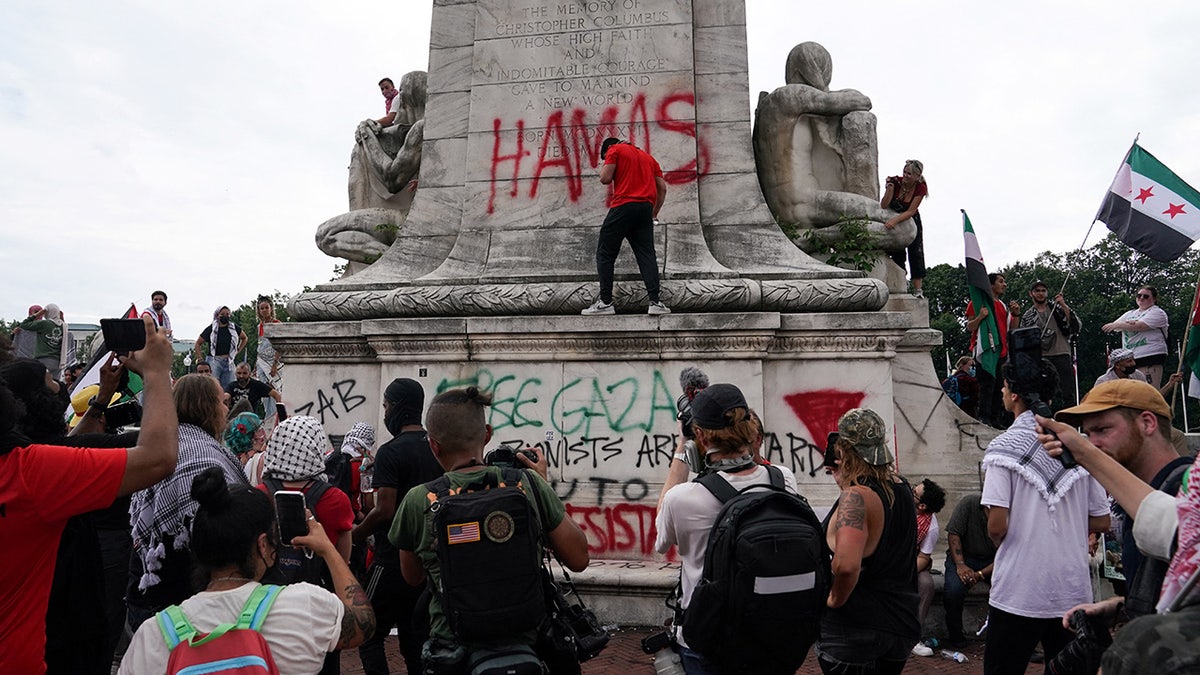
An anti-Israel demonstrator sprays graffiti on the Christopher Columbus Memorial Fountain at Union Station on the day of Israeli Prime Minister Benjamin Netanyahu’s address to a joint meeting of Congress on Capitol Hill in Washington July 24, 2024. (Reuters/Nathan Howard)
At least one demonstrator, whose face was covered, was spotted by Fox News carrying what appeared to be the flag of the terrorist group Hamas while others were heard shouting “Allahu Akbar.”
KAMALA HARRIS REACTS TO ANTI-ISRAEL RIOTS AT DC’S UNION STATION
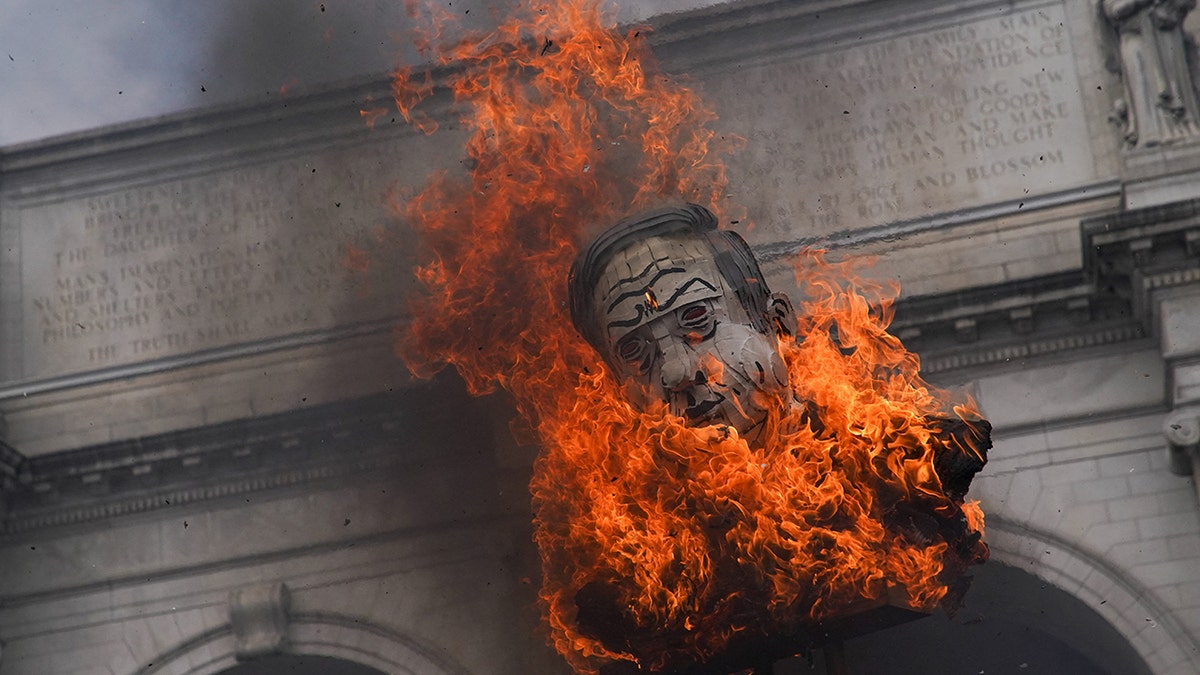
Anti-Israel demonstrators burn an effigy depicting Israeli Prime Minister Benjamin Netanyahu outside Union Station on the day of Netanyahu’s address to a joint meeting of Congress on Capitol Hill in Washington July 24, 2024. (Reuters/Nathan Howard)
The White House condemned the protests Wednesday evening, calling the chaos “disgraceful.”
“Identifying with evil terrorist organizations like Hamas, burning the American flag or forcibly removing the American flag and replacing it with another is disgraceful,” White House spokesperson Andrew Bates said in a comment to Fox News Digital Wednesday evening.
Politics
Ali: Kamala Harris has a campaign soundtrack: Beyoncé's 'Freedom'
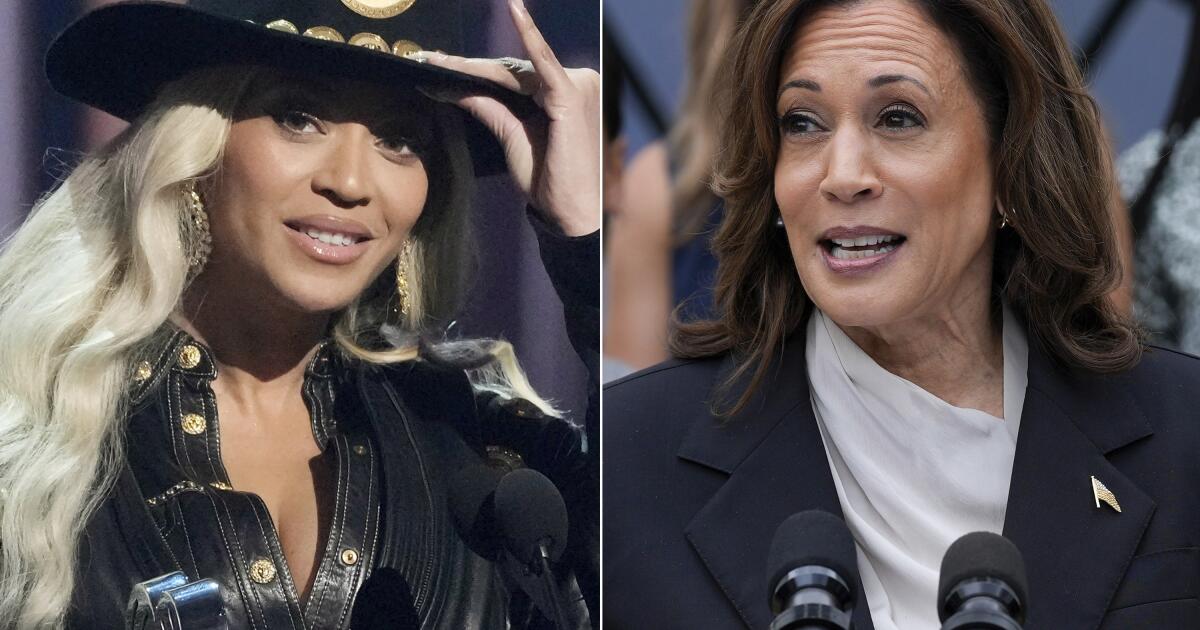
Vice President Kamala Harris’ bid for the presidency has a soundtrack: Beyoncé’s “Freedom.”
The leading Democratic presidential candidate took the stage in her first visit to her Wilmington, Del. campaign headquarters and again during her first campaign rally in Wisconsin as the song played.
Now the cathartic anthem graces Harris’ first campaign ad, in which she says: “There are some people who think that we should be a country of chaos, of fear, of hate. But us? We choose something different: We choose freedom.”
Pit that against the musical number her competitor chose for his grand entrance on Night 3 of the Republican National Conference. Donald Trump walked out to James Brown’s “It’s a Man’s, Man’s, Man’s World,” a tone-deaf choice for a former president found liable for sexual abuse, who’s bragged about sexually assaulting women, a married man who paid hush money to a porn star and a former president who rolled back women’s reproductive rights 50 years with the repeal of Roe vs. Wade.
Maybe the Godfather of Soul would have endorsed Trump’s usage of his song, but Brown would be breaking with decades’ worth of musicians who’ve decried GOP candidates playing their tracks at rallies and booster events. Adele, Rihanna, R.E.M., the Rolling Stones, Prince, Neil Young, Guns N’ Roses and Queen are among the many artists who’ve spoken out against Trump using their tunes for campaign purposes.
Heart bristled when the McCain-Palin campaign used “Barracuda.” Tom Petty insisted George W. Bush back away from “I Won’t Back Down.” Bruce Springsteen decried Ronald Reagan’s appropriation of “Born in the U.S.A.”
Beyoncé, however, gave Harris her blessing to use “Freedom,” a single from her 2016 blockbuster album “Lemonade.” The song, which features guest rapper Kendrick Lamar, is an explosive expression of empowerment. At the time of its release, it spoke to public outcry around police killings of unarmed Black men and women — Eric Garner, Tamar Rice, Freddie Gray — and protests that were largely fueled by the ire of younger generations.
Whether Beyoncé was singing about the tyranny of a cheating spouse or racial injustice (or both), the song became an anthem for a new, potentially potent block of the American electorate.
For the first time, Gen Z and millennials could now account for as many votes as baby boomers and their elders, groups that have made up a majority of the electorate for decades.
Folks under 40 have grown up with Beyoncé and her ubiquitous work. Think of Beyoncé like the Who for boomers — their work is everywhere (Republican Sen. Rand Paul played the band’s anti-war hit “Baba O’Riley” when he campaigned in 2015) — or Nirvana for Gen X, except no one cares what we think. Whatever, nevermind.
The Harris campaign’s smart choice of music coincides with a willingness to lean into a meme culture that shot up organically around the 59-year-old VP since President Biden announced Sunday that he was dropping out of the race.
Pop star Charli XCX showed her support for Harris when she tweeted “Kamala IS brat.” The British singer is referring to the TikTok and Twitter edits of Harris’ image superimposed to songs from Charli XCX’s hit album “Brat.” The avalanche of memes come from a video clip in which Harris talks about her mother’s response to the hubris of youth: “You think you just fell out of a coconut tree? You exist in the context of all in which you live and what came before you.”
Right-wing social media used the quote to deride Harris as inarticulate and a “word salad” master, but liberal swaths of Gen Z have since reworked the clip into emojis and memes that celebrate Harris’ nonconformist approach. She’s become a viral sensation, in a good way, unlike J.D. Vance’s damning “single cat lady” memes and a cringey internet joke about encounters with couches.
It’s rare that relevant talent will shill for a Republican candidate. Case in point: Trump’s pop culture ambassadors at this year’s RNC were Kid Rock, Kanye’s ex Amber Rose and former WWE wrestler Hulk Hogan, whose big moment was ripping his shirt off and screaming “Let Trump mania run wild!”
Harris chose to let freedom ring, and she has Queen Bey behind her.
Politics
Texas sues Biden administration over program giving birth control to teens without parents' knowledge

Texas officials are challenging a recent order from President Biden’s administration that would allow schools to distribute birth control to teenagers without parental consent.
Texas Attorney General Ken Paxton announced Thursday that his office is suing the Biden administration over their 2021 change to Title X guidelines banning parental consent requirements for birth control services.
“By attempting to force Texas healthcare providers to offer contraceptives to children without parental consent, the Biden Administration continues to prove they will do anything to implement their extremist agenda — even undermine the Constitution and violate the law,” Paxton said in a statement.
TRUMP SAYS HE ‘WILL NEVER ADVOCATE IMPOSING RESTRICTIONS ON BIRTH CONTROL’ OR OTHER CONTRACEPTIVES
A woman takes the next pill from a monthly pack of contraceptive pills. (Annette Riedl/picture alliance via Getty Images)
The Texas legal battle began in Dec. 2021 when US District Judge Matthew Kacsmaryk ruled that Title X — the federal program that provides free, confidential contraception to anyone regardless of age, income or immigration status — violates parental rights and violates state and federal laws.
The case was argued by former solicitor general of Texas Jonathan Mitchell, representing father Alex Deanda, who said he was “raising each of his daughters in accordance with Christian teaching on matters of sexuality, which requires unmarried children to practice abstinence and refrain from sexual intercourse until marriage.”
SCHUMER PLANS VOTE ON ‘CONSTITUTIONAL RIGHT TO CONTRACEPTION’ IN BID TO PROTECT SENATE DEMOCRAT MAJORITY
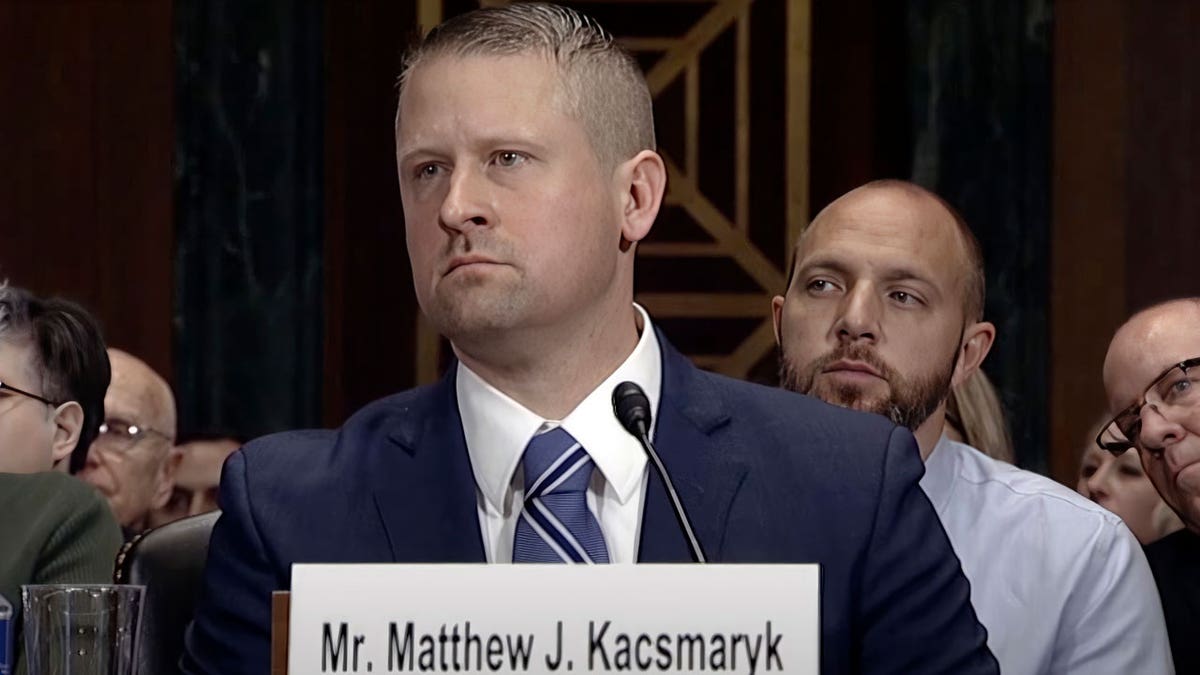
Kacsmaryk, a Trump appointee, previously ruled that parents must be informed when birth control is provided to their children under 18 years old. (Senate Judiciary Committee via AP)
In response, the federal government updated guidelines to state that Title X projects “may not require consent of parents or guardians for the provision of services to minors, nor can any Title X project staff notify a parent or guardian before or after a minor has requested and/or received Title X family planning services.”
Paxton is now seeking a permanent injunction on this rule, which he claims defies the findings of the federal court.
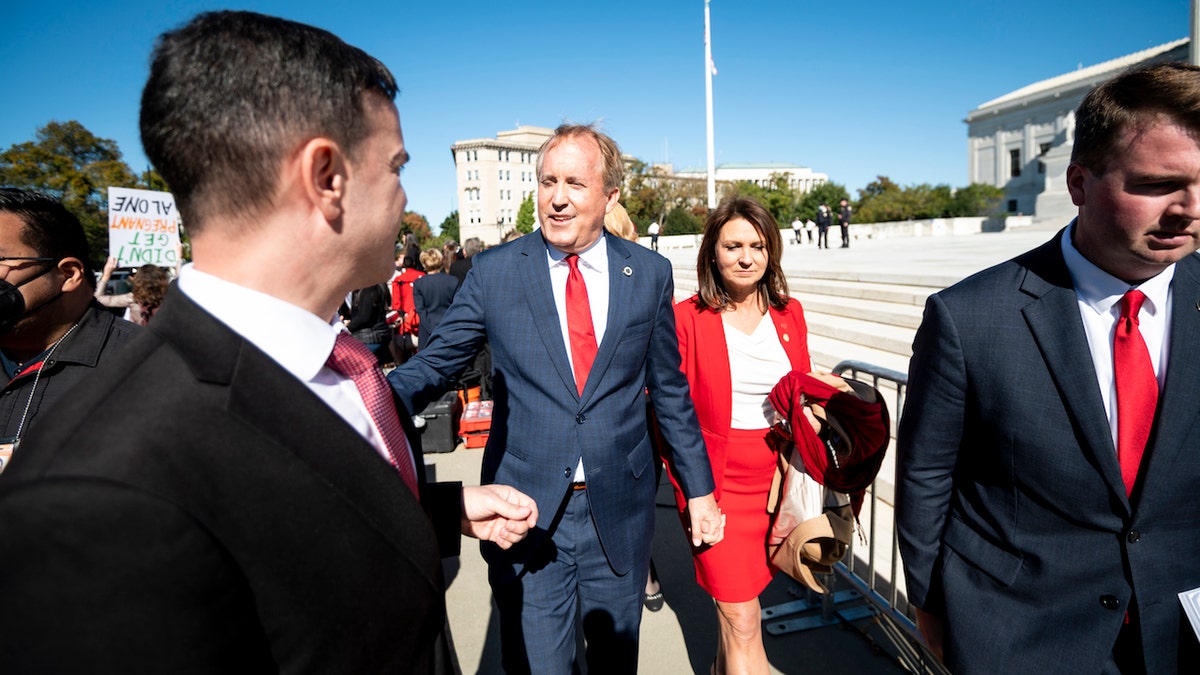
Paxton and his wife Angela are pictured outside the Supreme Court. (Bill Clark/CQ-Roll Call, Inc via Getty Images)
Paxton filed the lawsuit in a federal court in Amarillo. It will likely be heard by Kacsmaryk, the same judge who previously ruled parents must be informed of birth control provided to their children.
-

 World1 week ago
World1 week agoOne dead after car crashes into restaurant in Paris
-

 Midwest1 week ago
Midwest1 week agoMichigan rep posts video response to Stephen Colbert's joke about his RNC speech: 'Touché'
-

 News1 week ago
News1 week agoVideo: Young Republicans on Why Their Party Isn’t Reaching Gen Z (And What They Can Do About It)
-

 Movie Reviews1 week ago
Movie Reviews1 week agoMovie Review: A new generation drives into the storm in rousing ‘Twisters’
-

 News1 week ago
News1 week agoIn Milwaukee, Black Voters Struggle to Find a Home With Either Party
-

 Politics1 week ago
Politics1 week agoFox News Politics: The Call is Coming from Inside the House
-

 News1 week ago
News1 week agoVideo: J.D. Vance Accepts Vice-Presidential Nomination
-

 World1 week ago
World1 week agoTrump to take RNC stage for first speech since assassination attempt














